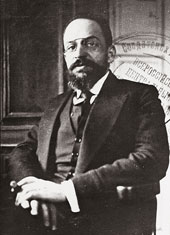Adolf Joffe
| Adolph Joffe Адо́льф Ио́ффе |
|
|---|---|
 |
|
| Ambassador of the Soviet Union to China | |
|
In office 1922–1924 |
|
| Preceded by | Nikolai Kudashev |
| Succeeded by | Lev Karakhan |
| Ambassador of the Soviet Union to Austria | |
|
In office 12 December 1924 – 29 June 1925 |
|
| Preceded by | Voldemar Aussem |
| Succeeded by | Jānis Bērziņš-Ziemelis |
| Member of the 6th Secretariat | |
|
In office 6 August 1917 – 8 March 1918 |
|
| Personal details | |
| Born |
Adolph Abramovich Joffe 10 October 1883 Simferopol, Russian Empire |
| Died | 16 November 1927 (44 years) Moscow, Russian SFSR, Soviet Union |
Adolph Abramovich Joffe (Russian: Адо́льф Абра́мович Ио́ффе, alternative transliterations Adolf Ioffe or, rarely, Yoffe) (10 October 1883 in Simferopol – 16 November 1927 in Moscow) was a Communist revolutionary, a Bolshevik politician and a Soviet diplomat of Karaite descent.
Adolf Abramovich Joffe was born in Simferopol, Crimea, Russian Empire in a wealthy Karaite family. He became a social democrat in 1900 while still in high school, formally joining the Russian Social Democratic Labor Party in 1903. In 1904 Joffe was sent to Baku, which he had to flee to avoid arrest. He was then sent to Moscow, but had to flee again, this time abroad. After the events of Bloody Sunday on January 9, 1905, Joffe returned to Russia and took an active part in the Russian Revolution of 1905. In early 1906 he was forced to emigrate and lived in Berlin until his expulsion from Germany in May 1906.
In Russia, Joffe was close to the Menshevik faction within the Russian Social Democratic Party. However, after moving to Vienna in May 1906, he became close to Leon Trotsky's position and helped Trotsky edit Pravda from 1908 to 1912 while studying medicine and with Alfred Adler, psychoanalysis. He also used his family's fortune to support Pravda financially. During the course of his underground revolutionary activity Joffe adopted the party name "V. Krymsky," the surname meaning "The Crimean."
...
Wikipedia
